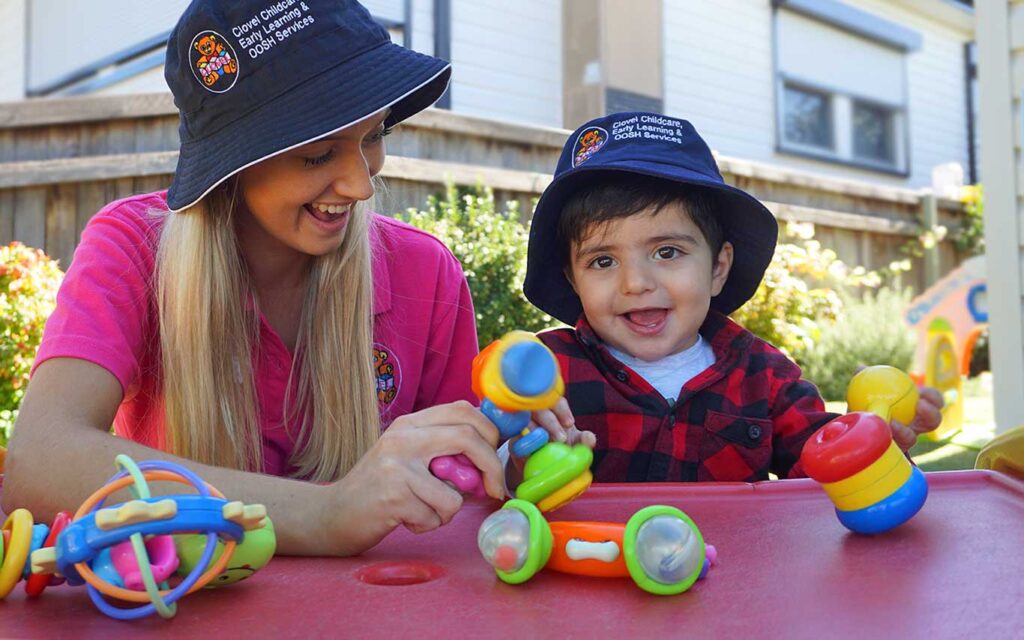

Separation anxiety is common among first-time preschoolers, and it is a perfectly natural reaction. New locations, faces, and routines add to a sense of unease that can be too much for some children to process and handle. Luckily, this sensation is an important part of young children’s development and is almost always temporary.


This is especially true if the child finds themself at a Clovel Childcare Centre, where they immediately experience a nurturing, stimulating, and fun environment. Our carefully designed and structured baby and preschool programs help them to overcome their separation anxiety. With personalised care and support, our experienced, highly qualified teams know just how to distract, comfort, and acclimatise youngsters. Before we know it, they are excitedly exploring their new environment and all fears are assuaged.
This article dives into the subject and provides practical advice and coping tips for separation anxiety in young children.
Separation anxiety in young children is a normal sensation of confusion and distress when separated from their parents or guardians. Typically occurring between 6 months and 3 years of age, it represents an important step in their development, showing that they have formed healthy, loving attachments to their guardians.
Separation anxiety is unpleasant to both experience and witness but is not cause for undue concern. Some typical ways that separation anxiety manifests in young children include:
Children often cry, cling to their loved ones, or become upset
A healthy reaction whereby youngsters are wary of unfamiliar people and places
A common scenario that sees youngsters remaining stressed and inconsolable for extended periods
Some children struggle to sleep alone or are restless after bedtime
Clovel Childcare understands the need for loving emotional support and a ‘home away from home’ that soothes anxious children. When you begin your journey with Clovel Childcare and visit one of our outstanding childcare centres, we think you’ll agree that we’ve succeeded.

We have established that separation anxiety is a normal part of young children’s development. However, the more we can understand the underlying causes, the better chance we have of successfully managing separation anxiety in toddlers. Some common factors that lead to this issue include:
Natural emotional development and attachments
Children develop strong attachment bonds with their parents, guardians, and caregivers as they grow. These attachments are signs of essential, healthy emotional development but can create feelings of anxiety when they are separated from trusted carers.
Unfamiliar routines, environments, and adults
Any significant life changes can be a bewildering, upsetting experience for young children, from moving house to meeting new babysitters. Starting preschool is no exception and can often trigger separation anxiety.
Parent/guardian anxiety
Children are finely tuned to their parents' emotions. The first day of Childcare is also a big day for parents, and young children may sense and magnify their natural emotions.
General temperament
We’re all different, and it is no surprise that some children are inherently more sensitive and anxious than others. We’ve all heard stories from family members who had one child who was thrilled to explore their new environment and didn’t even look back, and another who clung to their guardian and refused to participate.
Some children are naturally more inquisitive, robust, and adventurous at an early age, whereas others have to be coaxed and reassured. Neither of these is an extreme reaction. If anything, we must pay closer attention to those fearless youngsters prone to excitedly wandering off and potentially encountering danger.
Prior experiences
Incidents of separation in the past can linger in the memory and contribute to ongoing anxiety, especially if they were traumatic in some way, like getting lost in a crowded area. Understanding some of the causes behind the phenomena can help in developing strategies to support children through their anxiety.
Some practical coping tips for separation anxiety in young children include:
Consistent goodbye routines
Gradual transitions to new environments
Offering comfort items (e.g., a favourite toy)
Using positive reinforcement
Communicating openly with caregivers
Gradual exposure to the idea of preschool. Enthusiastic storytelling and descriptions of how much fun it is
Calm, confident, and non-negotiable parenting
Emotional support
Appropriate rewards and positive reinforcement
Patience and time
Some simple strategies parents can use at home for easing separation anxiety in kids include:

Lyn Connolly is the Founder and Company Director of Clovel Childcare & Early Learning Centres, a family‑owned group of eight centres across Western Sydney established from her first service at Merrylands. Active in early childhood education since 1977, she also serves as President of the Australian Childcare Alliance (ACA) NSW, representing providers in state and federal consultations, media, and public hearings.
Some telltale signs of separation anxiety include:
While it is impossible to give an answer that applies universally, it is safe to say that most children lose their sense of separation anxiety fairly quickly in safe, comfortable, loving, and stimulating environments. Consistent routines and predictability are crucial to managing separation anxiety in toddlers and as confidence grows, most are oblivious to their former fears within days or a few weeks at most.
The environment, structure, sense of safety, and predictable routines at childcare centres are significant in helping children with separation anxiety. Some effective strategies they typically employ include:
Some effective strategies and tips for separation anxiety in young children that persists or worsens include:
Choosing your child’s childcare and early learning centre is one of the biggest decisions you will ever have to make for your child. If you have more questions for us or would like to book a tour of one of our centres, please fill out our form and we’ll be in touch!






Join our Clovel newsletter to keep up to date with the latest news, blogs, tips & advice or follow us on YouTube, Facebook and Instagram.